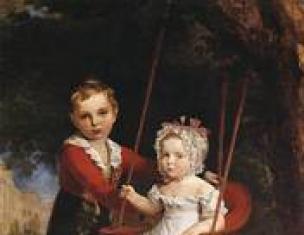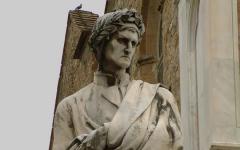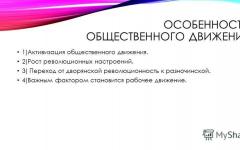// Notebooks of Anna Akhmatova. – M.; Torino, 1996
Gumileva
They told me that you died
Together with the golden leaf fall
And now, radiantly bright,
You rule over the unknown city above.
I'm ready to be forgotten by a legend,
You always seemed radiant
And the beauty of autumn leaves
More than once she admired me.
They say that you are gone.
But are the streams of love drying up?
Isn't the wind your song?
And the rays are not your kisses.
This, of course, was not written to me and not then. But I am sure that he had the idea of making me a heavenly city ruler, just as he made Blok the betrothed of Rus'.
<…>
Klyuev - fisher of men.
(“Rules the invisible city above”).
Notes:
Akhmatova (real name Gorenko; 1889-1966) - poet. Author Sat. “Evening” (1912), “Rosary” (1914), “Plantain” (1921), “From Six Books” (1940), “The Running of Time” (1965), etc. A.’s poetry is characterized by loyalty to the moral foundations of existence and human values, a heightened sense of history, an attraction to the classical heritage. She acted as a Pushkin scholar and did translations. In all likelihood, in the fall of 1911 in the journal. "Apollo" had a meeting with Klyuev. In 1912-1913 K. saw her several times at literary evenings, spoke at meetings of the “Workshop of Poets”, gave her his collection. “There were forest people” with the inscription: “To Anna Akhmatova - beloved poetess. Nikolay Klyuev. Andoma. 1913". (Quoted from MNK P. 67). For almost a quarter of a century, they “maintained a high, respectful opinion of each other. Each of them recognized the talent and originality of the other, and knew how to give him his due” (MNK. p. 69). Olga Berggolts told how “in her youth, when she wrote weak poems “like Yesenin,” she had an acquaintance, an aspiring poet, who knew Klyuev. He took her to the old man. The door was opened by some youth in a jacket. Greyhound dogs. Many icons and lamps. Klyuev said: “Read, girl, poetry.” I read, he listened. Then he stood up and said: “Sappho’s eagle is soaring above you... You yourself don’t know who you will be... Go to Anna, Anna Andreevna Akhmatova. Follow her advice” (Moldavsky D. Attraction of a fairy tale // Zv. 1979, No. 11. P. 170).
Published (in extracts) from the book: “The Notebooks of Anna Akhmatova (1956-1966).” M.-Torino, 1996. P. 176, 302, 429, 506.
Part of a line from Klyuev’s article “To the Slanders of Art” (1932).
Radetzky Ivan Markovich (1853-?) – journalist, author of articles on pedagogy and the unity of the Slavs.
In this case we are talking about the performance of the Acmeists in February. 1913. Akhmatova also described this episode in her memoir sketch “On the History of Acmeism,” an excerpt from which with the lines rearranged is given in the article by K. Azadovsky “N. Klyuev and the “Workshop of Poets” // VL. 1987, no. 4. P. 275.
Gumilyov Nikolai Stepanovich (1886-1921) - poet, translator, critic, prose writer. In the fall of 1911, he organized the “Workshop of Poets,” which united representatives of Acmeism, and headed this literary school. In poetry, G. created his own tradition, based on the principles of a strict selection of poetic means, a combination of intense lyricism with declamatory intonations, pathos with light irony and sophistication of language (collection “Romantic Flowers”, “Bonfire”, “Pillar of Fire”, etc.) . The acquaintance with Klyuev took place in the fall of 1911. K. gave the poet his collection. “Pine chime” with the inscription: “...we will go out for common prayer on the crisp sand of the golden islands. To dear N. Gumilev with wishes of peace and joy from the author. Andoma. November 1911" (Quoted from LN. T. 92. Book 4. P. 516, published by K. Azadovsky).
See previous note.
Under the general inscription: “Dedicated<ящается>Gumileva” the poet sent Akhmatova the article “Having rejected the world, forgiving the enemies...” (1910, 1913), “Slopes, lowlands, swamps...” (1911?), “Rusty snow, falling leaves...” (1911 ?) and “They told me that you died...” (1911?). I also wrote her a letter (remained unsent), in which I said: “Sorry for disturbing you, but I was drawn to show you these poems, since they were born only under the impression of meeting you. Feelings that came against my will are news to me, a discovery. Before meeting you, I was so afraid of such a feeling, but now the fear has disappeared, and, probably, more will be written in this Spirit. I ask you - is the spirit of these verses close to you? This is very important to me” (SD. pp. 194-195).
Akhmatova inaccurately quotes lines 5,6,7,11 (SE. P. 152).
This refers to Klyuev’s letter to Blok, written around November 30. 1911, in which he called on the poet to worship “not only Beauty,” but also “Suffering,” since “His temple, founded two thousand years ago, is forgotten and despised, the road to it is overgrown with willows and thistles: nevertheless dare to go forward! – In a forest clearing, in the green twilight of a wild forest, he took refuge. Under the low, dilapidated ceiling you will find the altar still in place and His thousand-year-old lamp burning unquenchably. Fall on your face before her, and as soon as the first tear rolls down from your eyes, the red ringing of pine trees will announce to the World-People about a new, so painfully awaited brother, about the betrothal of the servant of God Alexander - the servant of God of Russia” (SD. pp. 191-192).
“Klyuev was a catcher of souls,” said Akhmatova and clarified her thought. “He wanted to tell everyone his calling.” He explained to Blok that Russia was his “Wife.” He called me “Kitezhanka”” (Baev E. “On Zhukovskaya Street...” // LO.1985, No. 7. P. 102).
Modified line from Klyuev’s article “They told me that you died...”: “You rule the heavenly, unknown city.”







